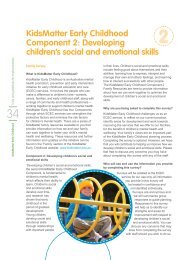Happy families work together [327KB] PDF - KidsMatter
Happy families work together [327KB] PDF - KidsMatter
Happy families work together [327KB] PDF - KidsMatter
You also want an ePaper? Increase the reach of your titles
YUMPU automatically turns print PDFs into web optimized ePapers that Google loves.
3component<strong>Happy</strong> <strong>families</strong> <strong>work</strong> <strong>together</strong>“Dad, will you tell Tina not to come into my room?” Twelve-year-old Luke was complainingabout his six-year-old sister. Luke’s Dad, Robert, had only just got home and was stillhanging up his coat. “Dad! She’s bugging me!” called Luke as he led Tina by the handinto the lounge room. “A ‘hello’ would be nice,” said Robert. “Yeah, hi. I’m trying to do myscience project. I need my space,” Luke replied. “Tina, how about you stay out here withme?” Robert suggested. Tina was not very keen on this idea. “But I want to play and you’llbe too busy,” she whined. “Here we go again”, thought Robert. “If only we all got on better.”Managing family relationships so that everyone’s most important needs get met canbe hard <strong>work</strong>. All <strong>families</strong> have times when tempers get frayed, feelings get hurt andmisunderstandings occur. Maintaining positive connections when these things happenrequires good communication and creative management.Effective communication means that everyone has a say and is listened to. This can bea challenge in busy <strong>families</strong>. Pressure to get things done can mean there seems to belittle ‘quality time’ for talking and listening to each other. Whether or not time is a problem,negative styles of communication often undermine relationships. This occurs, for example,when family members speak to each other disrespectfully or use put-downs.Building positive family relationships does not mean having no confl ict. Dealing withconfl icts positively, as well as making time to relax and do fun things <strong>together</strong>, help tostrengthen family relationships.Set the tone for positivecommunicationResearch on communication in <strong>families</strong> shows theimportance of parents and carers communicatingwarmth and caring and also setting clear expectationsfor children’s behaviour. Making time for familymembers, communicating effectively and supportingeach other are important ways of strengthening <strong>families</strong>and building positive relationships.Parents and carers can set a positive tone forcommunication through their own example. The wayyou listen, and the attention and importance you give towhat family members say, is as important as what yousay to them and how you say it. This may not always beeasy, especially when you are tired or busy and haveto deal with complaining or confl ict. However, listeningand acknowledging others’ feelings and wants helps toreduce confl ict and improves communication.
Working <strong>together</strong> as a familyDiscussing things as a family is often very helpful fordealing with concerns and negotiating solutions toconfl icts before they get bigger.• Talking <strong>together</strong> provides an opportunity to clarifyroles and expectations.• Be sure to talk about what is <strong>work</strong>ing well in familyrelationships and not just the diffi culties.• Build trust in family discussions by respecting andlistening to everyone’s views without judging orputting them down.• Encourage children as well as adults to hear andunderstand each other’s views and needs.Discussing things as a family can encourage childrenas well as adults to solve problems creatively. Forexample, once he understands that Tina just wantshim to play with her, 12-year-old Luke might negotiateto spend a half-hour playing with her after dinner inexchange for her giving him uninterrupted time to get onwith his home<strong>work</strong>. Having a chance to express needsin positive ways encourages healthy communication,support and cooperation.Things to discuss• Set up chores roster• Tina wants to play more• Luke wants space when he has to do school<strong>work</strong>• Dad (Robert) wants more hellos and hugsListening and talkingIt is easier for others to listen and accept your point ofview when the way you say it communicates respectand care. For example, Robert could say to Luke,“I know you had to get your science project done butI still want you to say ‘hello’ when I come home.”This shows that Robert understands Luke’s position,and wants Luke to understand his.Small things, like saying, “How was your day?” andreally listening to the answer, make a difference to thequality of communication in <strong>families</strong>. Saying sorry whenyou make a mistake or hurt someone’s feelings is alsoreally important.Ways to build caring family relationships• Show affection (eg hugs and kisses)• Offer help and support• Do fun things and laugh <strong>together</strong>• Make time to talk• Really listen to each otherThis resource is part of a range of <strong>KidsMatter</strong> Primary information sheets for <strong>families</strong> and school staff.View them all online at www.kidsmatter.edu.auCopyright: © Commonwealth of Australia 2012-13. This <strong>work</strong> is copyright. You may use this <strong>work</strong> in accordance with the terms of licence available at www.kidsmatter.edu.au


![Happy families work together [327KB] PDF - KidsMatter](https://img.yumpu.com/40767384/1/500x640/happy-families-work-together-327kb-pdf-kidsmatter.jpg)
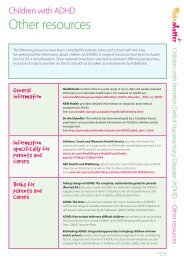
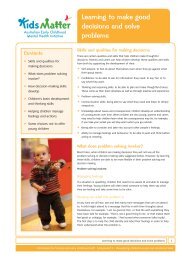
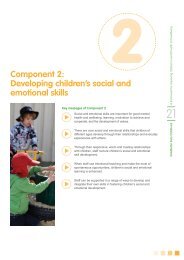
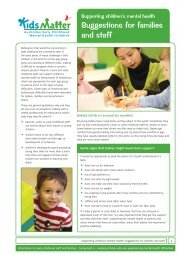
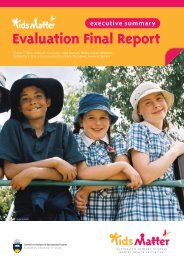
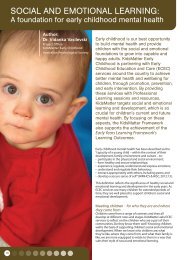
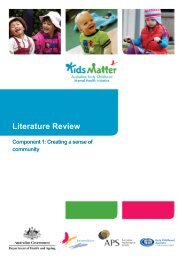
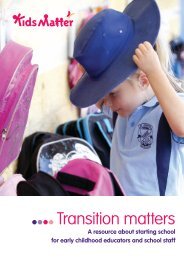
![Trinity Anglican School - Cairns story [378KB]pdf - KidsMatter](https://img.yumpu.com/41716076/1/184x260/trinity-anglican-school-cairns-story-378kbpdf-kidsmatter.jpg?quality=85)
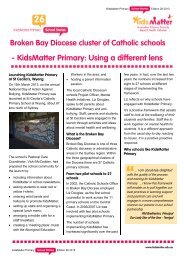
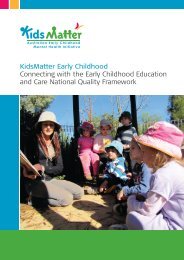
![Action Team Handbook 2012 [1.9M] [PDF] - KidsMatter](https://img.yumpu.com/38050920/1/184x260/action-team-handbook-2012-19m-pdf-kidsmatter.jpg?quality=85)
![[1008KB]pdf - KidsMatter](https://img.yumpu.com/38050895/1/184x260/1008kbpdf-kidsmatter.jpg?quality=85)
